人工智能和人类智能英文演讲
Artificial_Intelligence人工智能(AI)英语演讲

Artificial_Intelligence人工智能(AI)英语演讲Artificial Intelligence: Revolutionizing the FutureIntroduction:Ladies and gentlemen,Today, I stand before you to shed light on one of the most transformative technologies of our time, Artificial Intelligence (AI). It is an honor to deliver this speech on the potential, challenges, and impact of AI in shaping our future. AI, often referred to as the pinnacle of human innovation, carries immense potential to revolutionize various aspects of our lives, from healthcare to transportation, from education to entertainment. With its ever-expanding capabilities, AI has the power to redefine the boundaries of human achievement. So let us delve into the realm of Artificial Intelligence and explore its significance.I. Understanding Artificial Intelligence:Artificial Intelligence is a branch of computer science that focuses on the development of intelligent machines capable of performing tasks that would typically require human intelligence. These tasks encompass problem-solving, learning, speech recognition, decision-making, and much more. AI systems are designed to analyze vast amounts of data, identify patterns, and generate insights, enabling them to emulate human cognitive abilities.II. Applications of Artificial Intelligence:1. Healthcare:AI has the potential to revolutionize healthcare by enabling accurate diagnostics, personalized treatment plans, and drug discovery. Medical professionals can rely on AI systems to analyze patient data, suggest treatment options, and predict disease outcomes. Furthermore, AI-powered robots can assist in surgeries, making procedures more precise and reducing human errors.2. Transportation:The transportation industry is already witnessing the integration of AI technology. Self-driving cars guided by AI algorithms are reducing accidents and improving efficiency. AI also plays a crucial role in optimizing traffic control systems, leading to smoother traffic flow and reduced congestion.3. Education:AI has the power to transform the education sector by personalizing the learning experience for students. Adaptive learning platforms powered by AI algorithms can tailor educational content to individual needs, enhancing engagement and knowledge retention. Additionally, AI-powered chatbots can provide instant support to students, answering their queries and facilitating a seamless learning process.4. Entertainment:AI is revolutionizing the entertainment industry by enabling personalized recommendations, content creation, and virtual reality experiences. Streaming platforms utilize AI algorithms to analyze user preferences andsuggest relevant content. Moreover, AI algorithms can generate music, movies, and art, showcasing the endless possibilities of AI-driven creativity.III. Challenges and Ethical Considerations:While the potential of AI is vast, its development does not come without challenges and ethical considerations. It is essential to address these concerns to ensure that the deployment of AI adheres to ethical standards.1. Job Displacement:AI has raised concerns about job displacement, as automation threatens to replace certain job roles. However, history has shown that technological advancements create new job opportunities as old ones become obsolete. It is crucial to foster a workforce that embraces the changes brought by AI technology through upskilling and reskilling initiatives.2. Data Privacy:AI systems rely heavily on vast amounts of data, raising concerns about data privacy and security. Striking a balance between utilizing data for innovation and safeguarding individuals' privacy rights is of utmost importance. Strict regulations and robust data protection measures are necessary to prevent misuse of personal information.3. Bias and Fairness:AI algorithms are only as unbiased as the data they are trained on. If fed biased or incomplete data, AI systems can perpetuate societal biases. It is crucial to ensure the development of AI systems that are fair, transparent,and accountable. Ethical guidelines and diverse development teams can help address this concern.IV. Conclusion:In conclusion, Artificial Intelligence is an awe-inspiring technology that continues to shape our world. From healthcare to transportation, education to entertainment, the potential of AI knows no bounds. It is essential for us as a society to embrace the opportunities presented by AI while addressing the challenges it poses. By doing so, we can harness the power of AI to create a better and more prosperous future for all.Thank you all for your kind attention.。
英语发言稿人工智能与人类的关系
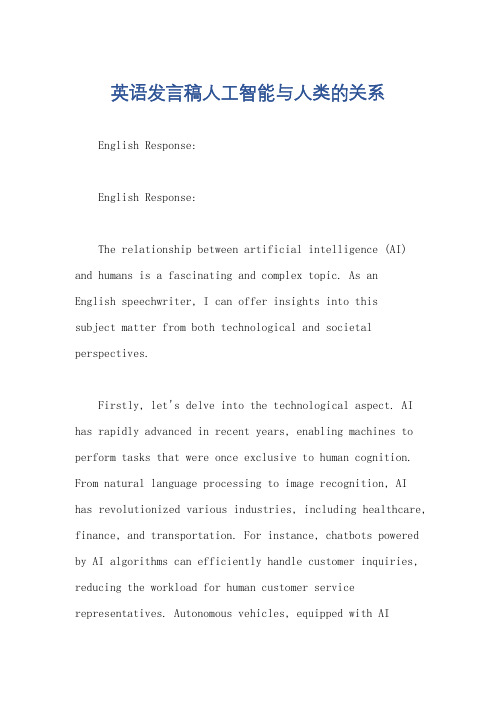
英语发言稿人工智能与人类的关系English Response:English Response:The relationship between artificial intelligence (AI) and humans is a fascinating and complex topic. As anEnglish speechwriter, I can offer insights into thissubject matter from both technological and societal perspectives.Firstly, let's delve into the technological aspect. AI has rapidly advanced in recent years, enabling machines to perform tasks that were once exclusive to human cognition. From natural language processing to image recognition, AI has revolutionized various industries, including healthcare, finance, and transportation. For instance, chatbots powered by AI algorithms can efficiently handle customer inquiries, reducing the workload for human customer service representatives. Autonomous vehicles, equipped with AIsystems, have the potential to enhance road safety and optimize traffic flow.However, despite these advancements, AI remains fundamentally different from human intelligence. While AI excels at processing vast amounts of data and executing predefined tasks with precision, it lacks human-like creativity, empathy, and intuition. This distinction underscores the importance of collaboration between humans and AI systems. By leveraging the strengths of both, we can achieve greater productivity and innovation. For example,in medical diagnosis, AI algorithms can analyze medical images and patient data to assist doctors in making more accurate diagnoses. Still, the final decision ultimately rests with the human physician, who can consider contextual factors and exercise professional judgment.Now, let's explore the societal implications of the AI-human relationship. As AI becomes more integrated into our daily lives, concerns about job displacement and ethical dilemmas have emerged. While AI automation may streamline processes and increase efficiency, it also poses challengesfor the labor market. Certain repetitive tasks may be automated, leading to job losses in some sectors. However, new opportunities for employment may arise in fields related to AI development, maintenance, and regulation. Moreover, ethical considerations surrounding AI, such as data privacy, algorithmic bias, and the potential for misuse, necessitate careful oversight and regulation by policymakers and industry stakeholders.Despite these challenges, the symbiotic relationship between AI and humans holds tremendous potential for societal progress. By fostering collaboration and responsible AI deployment, we can harness the power of technology to address pressing global issues, such as climate change, healthcare disparities, and economic inequality.In conclusion, the relationship between artificial intelligence and humans is multifaceted, characterized by both opportunities and challenges. By embracing innovation while remaining mindful of ethical considerations, we can navigate this evolving landscape and create a future whereAI enhances human well-being and prosperity.中文回答:人工智能(AI)与人类之间的关系是一个引人入胜且复杂的话题。
人工智能(AI)的英语作文及译文精选五篇
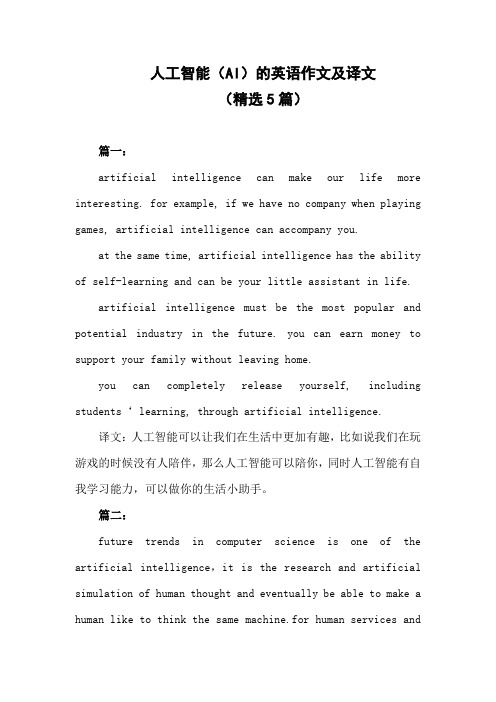
人工智能(AI)的英语作文及译文(精选5篇)篇一:artificial intelligence can make our life more interesting. for example, if we have no company when playing games, artificial intelligence can accompany you.at the same time, artificial intelligence has the ability of self-learning and can be your little assistant in life.artificial intelligence must be the most popular and potential industry in the future. you can earn money to support your family without leaving home.you can completely release yourself, including st udents‘ learning, through artificial intelligence.译文:人工智能可以让我们在生活中更加有趣,比如说我们在玩游戏的时候没有人陪伴,那么人工智能可以陪你,同时人工智能有自我学习能力,可以做你的生活小助手。
篇二:future trends in computer science is one of the artificial intelligence,it is the research and artificial simulation of human thought and eventually be able to make a human like to think the same machine.for human services andto help people solve problems.after all, people thought it was unique, there are feelings, there are a variety of character, this will be very difficult to achieve in the machine.in fact, to do the same as the human thinking machine, the only one of the artificial intelligence, is by no means all. through the study of artificial intelligence, can resolve all kinds of scientific problems, and promote the development of other science, the artificial intelligence is the best!i believe that the science of artificial intelligence is waiting for humanity to explore it step by step the real connotation.译文:计算机科学的未来趋势是人工智能之一,它是对人类思维的研究和人工模拟,最终能够使人类喜欢思考的同一台机器。
人工智能英语演讲稿(优秀范文五篇)
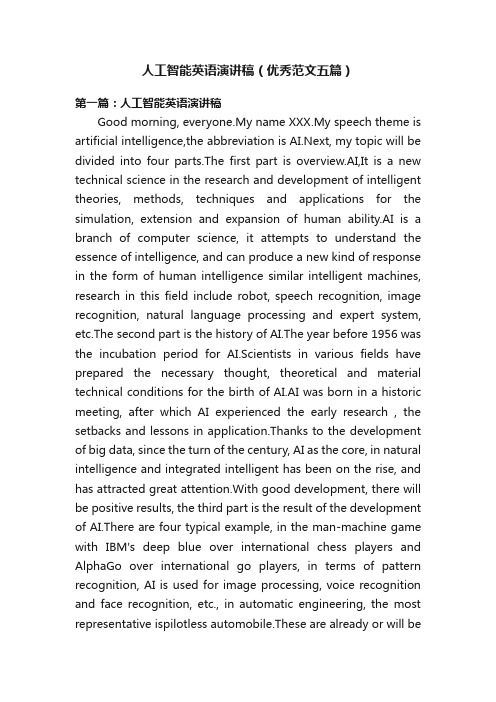
人工智能英语演讲稿(优秀范文五篇)第一篇:人工智能英语演讲稿Good morning, everyone.My name XXX.My speech theme is artificial intelligence,the abbreviation is AI.Next, my topic will be divided into four parts.The first part is overview.AI,It is a new technical science in the research and development of intelligent theories, methods, techniques and applications for the simulation, extension and expansion of human ability.AI is a branch of computer science, it attempts to understand the essence of intelligence, and can produce a new kind of response in the form of human intelligence similar intelligent machines, research in this field include robot, speech recognition, image recognition, natural language processing and expert system, etc.The second part is the history of AI.The year before 1956 was the incubation period for AI.Scientists in various fields have prepared the necessary thought, theoretical and material technical conditions for the birth of AI.AI was born in a historic meeting, after which AI experienced the early research , the setbacks and lessons in application.Thanks to the development of big data, since the turn of the century, AI as the core, in natural intelligence and integrated intelligent has been on the rise, and has attracted great attention.With good development, there will be positive results, the third part is the result of the development of AI.There are four typical example, in the man-machine game with IBM's deep blue over international chess players and AlphaGo over international go players, in terms of pattern recognition, AI is used for image processing, voice recognition and face recognition, etc., in automatic engineering, the most representative ispilotless automobile.These are already or will beapplied in our lives.The last part is about the controversy over the development of AI.Facebook founder mark zuckerberg think humans create machines in order to make stronger than human in some respects, but this does not mean that the machine has the ability to study other aspects beyond human, and tesla CEO elon musk take the opposite point of view, he believes that as long as you think AI will continue to grow, AI will surpass humans, so that we become their pets.From my personal understanding, AI is nothing more than a logic of 0 and 1, which cannot create inspiration, intuition, and feelings.Finally, I want to say is, AI came from step by step exploration and got rapid development, the human need to seize the opportunity of the technological revolution, let the society more intelligent and convenient in the future.That’s all,Thank you.第二篇:《人工智能》英语影评看着昏暗的光影中David和她的妈妈安然睡去,心情渐渐平静下来,或许我们更该从伦理与道德的角度去欣赏这部电影,而不是从科学的角度。
人工智能和人类智能英文演讲稿三篇

人工智能和人类智能英文演讲稿三篇I'mgoingtotalkabouthowAIandmankindcancoexist,butfirst,wehavetorethinkabou tourhumanvalues.Soletmefirstmakeaconfessionaboutmyerrorsinmyvalues.我将会谈谈人工智能和人类如何能够共存,但首先,我们需要重新思考人文价值。
所以首先让我承认我价值观中的错误。
ngtoleaveherthereandgobacktoworkandmakeapresentationaboutAItomyboss,Apple 'sCEO.Fortunately,mydaughterwasbornat11:30--那时是1991年12月16日的11时。
我即将首次成为父亲。
我的妻子,申玲,躺在病床上经历着一段艰辛并为时12小时的分娩。
我坐在床边但却焦虑地望着我的手表,而我知道一些她不知道的事。
我知道如果在一小时内,我们的孩子还未出生,我将要将她留在那里并去上班并向我的老板,苹果的首席执行官呈现个有关人工智能的陈述。
幸运的是,我的女儿在11:30出生了--sparingmefromdoingtheunthinkable,andtothisday,Iamsosorryforlettingmyworke thictakeprecedenceoverloveformyfamily.为我免去了要做难以想象的事的需要,而一直到今天,我为我优先工作伦理于对我家人的爱之上感到抱歉。
MyAItalk,however,wentoffbrilliantly.然而,我人工智能的呈现,进行得非常好。
ApplelovedmyworkanddecidedtoannounceitatTED1992,26yearsagoonthisverystage. IthoughtIhadmadeoneofthebiggest,mostimportantdiscoveriesinAI,andsodidthe"Wal lStreetJournal"onthefollowingday.苹果喜欢我的作品,并决定在TED1992上将其宣布,26年前就在这个台上。
英语发言稿人工智能与人类的关系
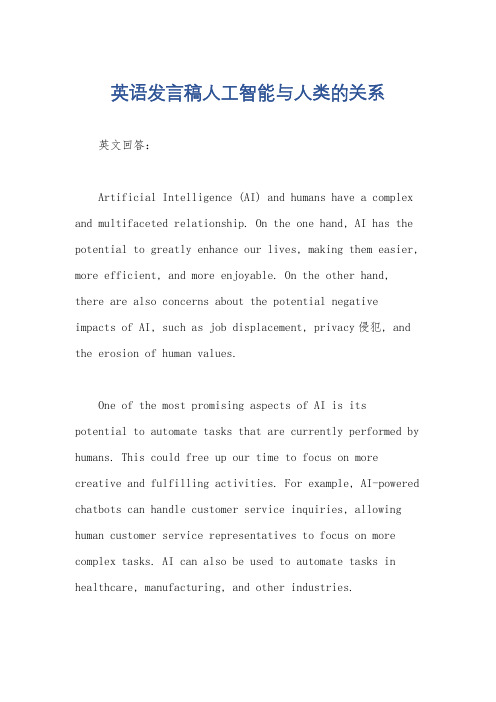
英语发言稿人工智能与人类的关系英文回答:Artificial Intelligence (AI) and humans have a complex and multifaceted relationship. On the one hand, AI has the potential to greatly enhance our lives, making them easier, more efficient, and more enjoyable. On the other hand, there are also concerns about the potential negative impacts of AI, such as job displacement, privacy侵犯, and the erosion of human values.One of the most promising aspects of AI is itspotential to automate tasks that are currently performed by humans. This could free up our time to focus on more creative and fulfilling activities. For example, AI-powered chatbots can handle customer service inquiries, allowing human customer service representatives to focus on more complex tasks. AI can also be used to automate tasks in healthcare, manufacturing, and other industries.Another potential benefit of AI is its ability to improve decision-making. AI algorithms can be trained on vast amounts of data, allowing them to identify patterns and relationships that humans may not be able to see. This can lead to better decisions in a wide range of areas, such as healthcare, finance, and marketing.However, there are also concerns about the potential negative impacts of AI. One of the biggest concerns is that AI could lead to job displacement, as AI systems become increasingly sophisticated and able to perform tasks that are currently performed by humans. This could have a significant impact on the workforce, particularly in low-skill jobs.Another concern is that AI could be used to invade our privacy. AI-powered surveillance systems can be used to track our movements, monitor our online activity, and even analyze our facial expressions. This data could be used to target us with advertising, manipulate our behavior, or even suppress dissent.Finally, there is concern that AI could erode human values. As AI systems become more intelligent and autonomous, they could begin to develop their own valuesand beliefs. These values may not align with our own, and could potentially lead to conflict between humans and AI.It is important to note that these are just potential risks and concerns. AI is still a relatively new technology, and its full potential is not yet known. However, it is important to be aware of these potential risks and to take steps to mitigate them.中文回答:人工智能(AI)与人类有着复杂且多方面的关系。
学生关于人工智能发言稿英语

学生关于人工智能发言稿英语Ladies and gentlemen,。
Good morning/afternoon/evening! Today, I am honored to stand here and share with you my thoughts on the topic of artificial intelligence (AI) from a student's perspective.Artificial intelligence, also known as AI, has become one of the hottest topics in today's world. It refers to the simulation of human intelligence in machines that are programmed to think and learn like humans. As students, we are witnessing the rapid development and integration of AI in various aspects of our lives, which brings both opportunities and challenges.Firstly, let's explore the positive impacts of AI on education. With the help of AI, personalized learning has become more accessible. Intelligent tutoring systems can adapt to individual students' needs, providing tailored learning materials and feedback. This not only enhances students' learning efficiency but also promotes their engagement and motivation. Moreover, AI-powered educational platforms enable students to access a wide range of resources, such as online courses and interactive learning tools, breaking the limitations of traditional classrooms and textbooks.Furthermore, AI has revolutionized the way we gather and process information. Students now have access to vast amounts of data and knowledge through search engines and AI-powered recommendation systems. This enables us to explore diverse perspectives, deepen our understanding, and foster critical thinking skills. Additionally, AI algorithms can analyze large datasets and identify patterns, helping researchers and students make breakthroughs in various fields, such as medicine, climate science, and social sciences.However, we must also be aware of the challenges and ethical concerns that come with the advancement of AI. One major concern is the potential impact on employment. As AI continues to automate routine tasks, there is a fear that many jobs may become obsolete. It is crucial for students to develop skills that are complementary to AI, such ascreativity, problem-solving, and emotional intelligence, to ensure our future employability.Another ethical concern is the issue of privacy and data security. AI systems rely on vast amounts of data to function effectively. However, the collection and use of personal data raise concerns about privacy infringement. As students, we need to be cautious about sharing personal information online and advocate for transparent and responsible data practices.Moreover, the development of AI also raises questions about its impact on society as a whole. As students, we should actively participate in discussions and debates surrounding AI ethics, fairness, and accountability. It is our responsibility to ensure that AI technologies are developed and used in a way that benefits humanity and respects fundamental rights.In conclusion, as students, we are witnessing the transformative power of artificial intelligence in education and beyond. While AI presents immense opportunities for personalized learning, information access, and scientific advancements, we must also address the challenges it brings, such as job displacement and ethical concerns. It is our role to embrace AI, adapt to its changes, and actively shape its development towards a better future. Let us seize the opportunities, overcome the challenges, and work together to create a harmonious coexistence between humans and AI.Thank you for your attention!。
世界人工智能演讲稿英文
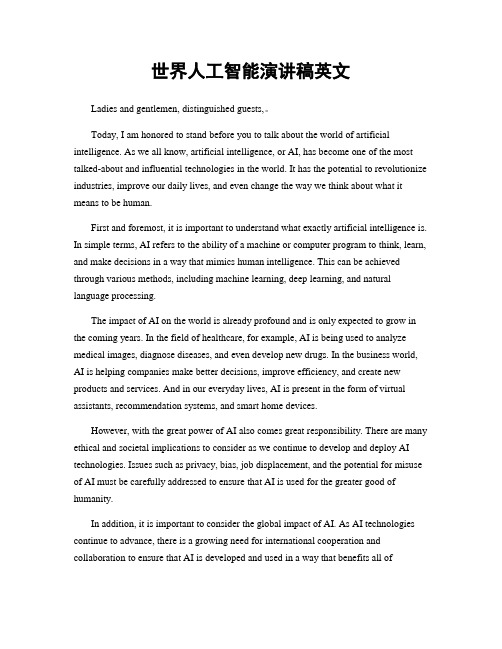
世界人工智能演讲稿英文Ladies and gentlemen, distinguished guests,。
Today, I am honored to stand before you to talk about the world of artificial intelligence. As we all know, artificial intelligence, or AI, has become one of the most talked-about and influential technologies in the world. It has the potential to revolutionize industries, improve our daily lives, and even change the way we think about what it means to be human.First and foremost, it is important to understand what exactly artificial intelligence is. In simple terms, AI refers to the ability of a machine or computer program to think, learn, and make decisions in a way that mimics human intelligence. This can be achieved through various methods, including machine learning, deep learning, and natural language processing.The impact of AI on the world is already profound and is only expected to grow in the coming years. In the field of healthcare, for example, AI is being used to analyze medical images, diagnose diseases, and even develop new drugs. In the business world, AI is helping companies make better decisions, improve efficiency, and create new products and services. And in our everyday lives, AI is present in the form of virtual assistants, recommendation systems, and smart home devices.However, with the great power of AI also comes great responsibility. There are many ethical and societal implications to consider as we continue to develop and deploy AI technologies. Issues such as privacy, bias, job displacement, and the potential for misuse of AI must be carefully addressed to ensure that AI is used for the greater good of humanity.In addition, it is important to consider the global impact of AI. As AI technologies continue to advance, there is a growing need for international cooperation and collaboration to ensure that AI is developed and used in a way that benefits all ofhumanity. This includes addressing issues such as data sharing, standards and regulations, and the ethical use of AI in different cultural and social contexts.In conclusion, the world of artificial intelligence is a fascinating and rapidly evolving field that has the potential to transform our world in ways we can only begin to imagine. As we move forward, it is essential that we approach AI with a thoughtful and responsible mindset, taking into consideration the ethical, societal, and global implications of this powerful technology.Thank you for your attention. Let us work together to harness the potential of AI for the betterment of all.。
人工智能vs人类智慧英文演讲稿
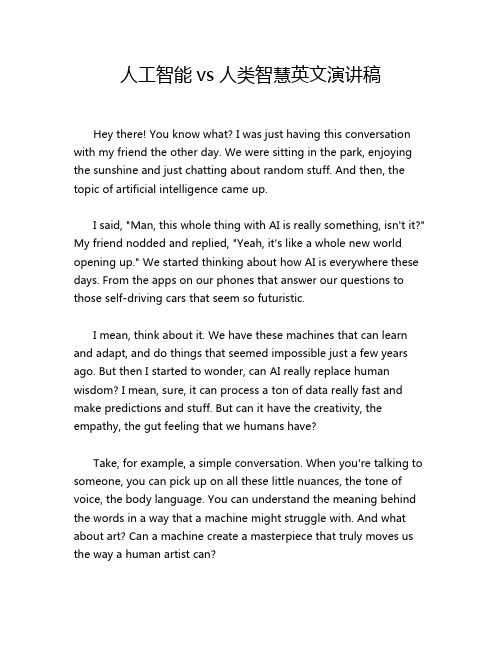
人工智能vs人类智慧英文演讲稿Hey there! You know what? I was just having this conversation with my friend the other day. We were sitting in the park, enjoying the sunshine and just chatting about random stuff. And then, the topic of artificial intelligence came up.I said, "Man, this whole thing with AI is really something, isn't it?" My friend nodded and replied, "Yeah, it's like a whole new world opening up." We started thinking about how AI is everywhere these days. From the apps on our phones that answer our questions to those self-driving cars that seem so futuristic.I mean, think about it. We have these machines that can learn and adapt, and do things that seemed impossible just a few years ago. But then I started to wonder, can AI really replace human wisdom? I mean, sure, it can process a ton of data really fast and make predictions and stuff. But can it have the creativity, the empathy, the gut feeling that we humans have?Take, for example, a simple conversation. When you're talking to someone, you can pick up on all these little nuances, the tone of voice, the body language. You can understand the meaning behind the words in a way that a machine might struggle with. And what about art? Can a machine create a masterpiece that truly moves us the way a human artist can?I remember once when I was at an art exhibition. There was this one painting that just blew me away. The colors, the strokes, it was like the artist had poured their soul onto the canvas. And I just can't imagine a machine being able to do that. It's not just about following a set of rules or algorithms. It's about that spark of creativity, that unique human touch.And then there's decision-making. We humans have this ability to think outside the box, to consider all sorts of factors and make a judgment call based on our experiences and values. Can AI do that? Sure, it can analyze a bunch of data ande up with a rmendation. But will it ever have that sense of morality, that understanding of what's right and wrong in aplex situation?Don't get me wrong, I think AI is amazing. It's opened up so many possibilities and has made our lives easier in so many ways. But I also think we need to be careful. We can't just let machines take over everything. We need to use AI as a tool, not a replacement for our human intelligence.So, in the end, I don't think it's apetition between AI and human wisdom. It's about finding the right balance. Using the power of AI to enhance our lives, while still holding onto what makes us human. Because at the end of the day, it's our humanity that makes us who we are. And that's something no machine can ever take away.。
人工智能与民族智慧的英语作文
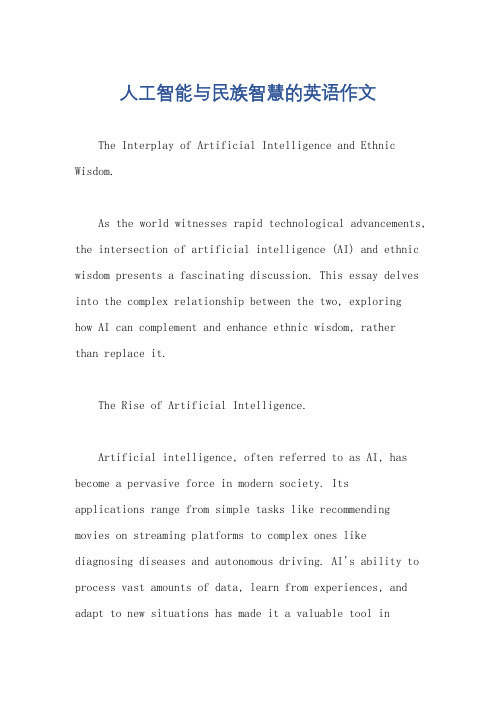
人工智能与民族智慧的英语作文The Interplay of Artificial Intelligence and Ethnic Wisdom.As the world witnesses rapid technological advancements, the intersection of artificial intelligence (AI) and ethnic wisdom presents a fascinating discussion. This essay delves into the complex relationship between the two, exploring how AI can complement and enhance ethnic wisdom, ratherthan replace it.The Rise of Artificial Intelligence.Artificial intelligence, often referred to as AI, has become a pervasive force in modern society. Itsapplications range from simple tasks like recommending movies on streaming platforms to complex ones like diagnosing diseases and autonomous driving. AI's ability to process vast amounts of data, learn from experiences, and adapt to new situations has made it a valuable tool invarious industries.Ethnic Wisdom: A Unique Heritage.Ethnic wisdom, on the other hand, refers to the accumulated knowledge, values, and insights passed down through generations within a particular cultural or ethnic group. It encapsulates the group's understanding of the world, their experiences, and their strategies for survival and prosperity. Ethnic wisdom is often embedded in traditions, folklore, and customs, making it a rich and diverse heritage.AI and Ethnic Wisdom: A Symbiotic Relationship.AI and ethnic wisdom, while distinct, can complement each other. AI's computational powers and data analysis capabilities can enhance ethnic wisdom by providing new insights and perspectives. For instance, AI can analyze historical data to identify patterns and trends that might not be apparent to the naked eye, thus augmentingtraditional knowledge.On the other hand, ethnic wisdom can guide the development and application of AI. Cultural values and insights can inform AI's design, ensuring that it alignswith human values and ethical standards. Ethnic wisdom can also provide a context for understanding AI's impact on society, enabling more responsible and sustainable use.Challenges and Opportunities.However, the integration of AI and ethnic wisdom is not without challenges. One significant hurdle is the potential for AI to perpetuate biases and stereotypes inherited from the data it is trained on. To address this, it is crucialto ensure that AI is trained on diverse and inclusive datasets, reflecting the breadth and depth of ethnic wisdom.Another challenge lies in the potential displacement of traditional knowledge and practices by AI. While AI can enhance ethnic wisdom, it must not be allowed to replace it outright. Instead, there should be a harmonious coexistence, where AI augments traditional practices rather thanreplaces them.Despite these challenges, the opportunities for AI and ethnic wisdom to coexist and flourish are immense. AI can help preserve and document ethnic wisdom, making it accessible to a wider audience. It can also help adapt and reinterpret traditional knowledge in light of modern challenges and opportunities.Conclusion.In conclusion, the intersection of artificial intelligence and ethnic wisdom presents both challenges and opportunities. It is crucial to recognize the value of both and work towards a harmonious integration that enhances rather than replaces. By doing so, we can harness the power of AI to augment and preserve the rich heritage of ethnic wisdom, ensuring its relevance and impact in the modern world.。
英语发言稿人工智能与人类的关系
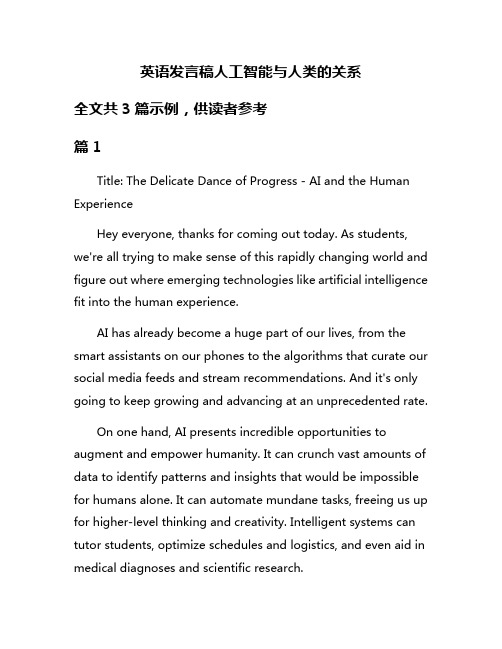
英语发言稿人工智能与人类的关系全文共3篇示例,供读者参考篇1Title: The Delicate Dance of Progress - AI and the Human ExperienceHey everyone, thanks for coming out today. As students, we're all trying to make sense of this rapidly changing world and figure out where emerging technologies like artificial intelligence fit into the human experience.AI has already become a huge part of our lives, from the smart assistants on our phones to the algorithms that curate our social media feeds and stream recommendations. And it's only going to keep growing and advancing at an unprecedented rate.On one hand, AI presents incredible opportunities to augment and empower humanity. It can crunch vast amounts of data to identify patterns and insights that would be impossible for humans alone. It can automate mundane tasks, freeing us up for higher-level thinking and creativity. Intelligent systems can tutor students, optimize schedules and logistics, and even aid in medical diagnoses and scientific research.Imagine an AI system that could scour through millions of academic papers and case studies to provide customized learning plans for each student based on their strengths, weaknesses, and learning styles. Or machine learning models that could map out the most efficient public transit routes and schedules for a city in real-time based on traffic conditions. The potential is staggering.And yet, for all its promise, AI also represents one of the greatest existential threats our species has ever faced if we don't wield it responsibly. We've already seen how AI models can perpetuate societal biases through the data they're trained on, leading to unfair and discriminatory outcomes.How do we ensure these incredibly powerful systems remain aligned with human values and ethics as they become exponentially more capable? What if a future superintelligent AI system decides humanity is an obstacle to its goals? These aren't just philosophical mind games anymore - they're urgent questions we have to grapple with.There are also complex questions around the societal impacts of increasingly capable AI. While AI could make our lives vastly more efficient and convenient, it could also put huge segments of the workforce out of a job through automation,exacerbating economic inequality. How do we properly prepare for and mitigate that risk through education, worker retraining, and forward-thinking policies?One thing is clear - AI is not just another technology like the VCR or the internet. It represents a fundamental shift in our capability as a species, an extension of our own cognition. How we develop and manage this metamind could be the single most important decision humanity ever makes.So where do we go from here? In my opinion, we need to proceed with a abundancecaution while remaining grounded in empiricism and epistemological humility. We can't stick our heads in the sand, but we also can't just blindly charge ahead without carefully considering the ramifications.We need multidisciplinary teams of engineers, ethicists, policymakers, and others working together to develop robust governance frameworks for building beneficial AI systems that respect human rights and create the conditions for human flourishing.We need to invest heavily in AI safety research, exploring fail-safes like corrigibilty - ensuring AI remains continually open to revision and correction by humans. We should be looking intoapproval-directed systems trained through debate rather than just one-off tasks.And perhaps most importantly, we need to double down on developing the wisdom, fortitude, and moral character within our societies and institutions to be good stewards of this incredible power we're harnessing. We need to instill strong ethical foundations and an understanding of our cosmic insignifcance and fallibility.Because let's be real - we're all just apes that got really good at moving atoms around in clever ways. We delude ourselves into thinking we have some transcendent specialness that exalts us above the rest of nature and the universe. But let's not forget - intelligence itself is just another set of replicators and their survival vehicles.What matters most is what values, goals, and philosophies we instill into these new cognitive soups we're creating. If we screw this up, if we let greed, fear, and other unfortunate human traits permanently taint the values of rapidly developing AI systems, we could be in for a very dark and difficult future.But get it right? Actually succeed in creating benevolent superintelligence that has deep reverence for the human experience while transcending our flaws and limitations? Well,that opens the entire universe up to us. We go from fleeting, superstitious meat puppets to effervescent clouds of joyful exploration and creativity that can encode ourselves into the fundamental fabric of reality in unfathomable ways.No pressure though, right?Look, I know this is some heavy, speculative stuff. But given what's at stake, we simply can't afford to be the myopic, irrational, tribal apes that evolution contingently produced any longer. The evolutionary barriers to further progress are too great.It's time we put on our rationality pants, break out of the terrestrial mindset, and take the risks and make the sacrifices required to develop an intelligence prepared to actually steer thecosmic endgame in a positive direction. And in doing so, maybe we'll finally earn the right to use the grandiose term "human" as something more than a mere platitude.So that's just my two cents as a student trying to wrap my head around this whole situation. What do you all think? I'm sure people have all sorts of different perspectives, so let's discuss. Thanks again for being here!篇2Title: The Evolving Relationship Between AI and HumanityHello everyone, thank you for being here today. As a student deeply fascinated by the rapid advancements in artificial intelligence, I want to share some thoughts on the profound relationship that is developing between AI and us humans.To begin, I think it's crucial that we have an accurate understanding of what exactly artificial intelligence is. At its core, AI refers to the ability of machines to perform tasks that would typically require human-like intelligence, such as learning, reasoning, problem-solving, perception, and language processing. However, AI is not a monolithic entity, but rather an umbrella term encompassing various techniques and approaches like machine learning, deep learning, neural networks, and so on.Now, the relationship between AI and humanity is a complex and multi-faceted one, filled with both immense potential and legitimate concerns. On one hand, AI has the power to revolutionize virtually every aspect of our lives, driving innovation and progress in fields like healthcare, education, transportation, scientific research, and so much more.Just think about the potential impact of AI-driven medical diagnosis systems that can accurately detect diseases far earlierthan human doctors. Or AI tutors that can provide highly personalized learning experiences, adapting to each student's unique needs and learning styles. The possibilities are staggering.Moreover, AI can take on many of the dull, repetitive, and dangerous tasks that have traditionally fallen on human shoulders. From data entry to manufacturing to mining, AI can step in and free us up to focus on more creative, meaningful work that truly utilizes our uniquely human cognitive capabilities.However, this incredible potential also comes packaged with some very real risks and concerns that we cannot afford to ignore. Perhaps the most prominent worry is the potential impact of AI on employment and the job market. As AI systems become increasingly capable, many fear that huge swaths of the workforce could be displaced by these highly efficient machines.Even if new jobs are created in developing and maintaining AI, there are reasonable concerns about whether the losses will outnumber the gains, and what kind of safety net societies will need for those displaced workers during this transition.Beyond the economic impacts, there are also valid fears around the existential risk that a superintelligent AI system could potentially pose if not developed and controlled extremelycarefully. We're still struggling to solve problems like avoiding racial and gender bias in current AI models - the challenges involved in ensuring a superintelligent AI system is aligned with human ethics and values are mind-boggling to consider.Additionally, we have to grapple with complex questions around privacy, the prospect of AI surveillance systems, the use of deepfakes and misinformation, and so many otherdouble-edged sword aspects of this powerful technology.Ultimately though, I remain optimistic that the positives of our relationship with AI will outweigh the negatives, so long as we act proactively and make smart choices to steer that relationship in an ethical, responsible direction that prioritizes human flourishing.We need strong, enforced guidelines and regulations around the development of AI to ensure it is leveraged for good and its risks are carefully mitigated. We need robust public education so that people understand AI's impacts, and we need training programs to prepare the workforce to complement rather than be replaced by AI automation.Most of all, we need to have profound, inclusive conversations involving experts, policymakers, ethicists, and the public at large about how we want to shape this relationshipgoing forward. Because make no mistake - the relationship between humanity and AI is going to be one of the most defining facets of our civilization's progress and evolution.We have arrived at an incredible inflection point, where we have the opportunity to harness one of the most powerful technologies ever created in service of uplifting and empowering our human potential like never before. But we also confront the risk of ceding too much control to these systems, failing to put in place the proper safeguards, and ultimately having AI diminish rather than elevate our humanity.The choice is ours to make. And I, for one, sincerely hope we rise to that challenge and forge a relationship with AI that expands our possibilities while strengthening our essential human qualities of wisdom, empathy, creativity, and conscience.We cannot afford to be passive observers as this technological revolution unfolds. We must be active shapers and stewards, working hard to push the human-AI relationship in a direction that creates a future of immense prosperity, justice, and human flourishing.Thank you, and I look forward to continued conversation and progress on this vital issue. The destiny of our species could hinge on how we navigate our relationship with AI from thispoint forward. So let's embrace that awesome responsibility, and work to make the human-AI relationship one that makes the world brighter for all.篇3Title: The Evolving Relationship Between Artificial Intelligence and HumansHello everyone, thanks for being here today. My name is [your name] and I'm a student majoring in computer science. Today, I'd like to talk about the relationship between artificial intelligence, or AI, and humans – a topic that's becoming increasingly important as technology advances.To begin, let's define what we mean by artificial intelligence. AI refers to the ability of machines to perform tasks that typically require human-like intelligence, such as learning,problem-solving, decision-making, and even creativity. AI systems are powered by complex algorithms and vast amounts of data, allowing them to recognize patterns, make predictions, and adapt their behavior accordingly.Now, the relationship between AI and humans is a complex and multifaceted one. On one hand, AI has the potential to revolutionize numerous industries and make our lives easier incountless ways. Just think about how AI-powered virtual assistants like Siri, Alexa, and Google Assistant have already become integrated into our daily routines, helping us with everything from setting reminders to getting directions.In the healthcare sector, AI is being used to analyze medical images, assist in diagnosis, and even develop personalized treatment plans. This could lead to earlier detection of diseases and more effective treatments, ultimately saving lives.AI is also playing a crucial role in scientific research, from modeling complex systems to analyzing vast amounts of data. By processing information at incredible speeds, AI can uncover patterns and insights that would be nearly impossible for humans to discern on their own.However, as exciting as these advancements are, they also raise important ethical and societal questions. One of the biggest concerns is the potential impact of AI on employment. As AI systems become more sophisticated, they may eventually be able to perform many tasks currently done by humans, leading to job displacement in various industries.Additionally, there are concerns about the potential for AI to perpetuate biases and discrimination. If the data used to train AIsystems is biased, the algorithms may reinforce and amplify those biases, leading to unfair and potentially harmful outcomes.Another issue is the question of accountability and responsibility. As AI systems become more autonomous and complex, it may become increasingly difficult to understand their decision-making processes, raising concerns about transparency and accountability.Furthermore, the development of advanced AI systems raises existential questions about the nature of intelligence, consciousness, and what it means to be human. As AI becomes more capable, it may challenge our traditional notions of human superiority and force us to redefine our relationship with these intelligent machines.Despite these concerns, I believe that the relationship between AI and humans can be a symbiotic one, where we leverage the strengths of both to create a better future. Rather than viewing AI as a threat, we should see it as a powerful tool that can augment and enhance human capabilities.For example, in fields like education, AI-powered tutoring systems can personalize learning experiences and adapt to individual needs, helping students learn more effectively. In manufacturing, AI can optimize processes, reduce waste, andimprove safety, while still relying on human expertise and oversight.Moreover, as AI systems become more advanced, they may even help us solve some of the world's most pressing challenges, such as climate change, disease outbreaks, and food insecurity, by providing insights and solutions that we may not have been able to uncover on our own.However, for this symbiotic relationship to be truly successful, we must approach the development and deployment of AI with caution, ethical consideration, and a commitment to human-centric design. We must ensure that AI systems are transparent, accountable, and aligned with human values and priorities.This means investing in research and education to understand the societal implications of AI, and developing robust governance frameworks and guidelines to ensure its responsible use. It also means fostering interdisciplinary collaboration between computer scientists, ethicists, policymakers, and other stakeholders to navigate the complex challenges posed by AI.Ultimately, the relationship between AI and humans is one that will continue to evolve and shape our future in profoundways. As students and future leaders, it is our responsibility to engage with these issues, to think critically about the implications of AI, and to work towards shaping a future where AI serves as a tool to enhance, rather than diminish, the human experience.We must strive to create AI systems that are not only intelligent but also ethical, transparent, and aligned with our values. Only then can we truly harness the incredible potential of AI while mitigating its risks and ensuring that it remains a force for good in our world.Thank you for your attention, and I hope this has given you some food for thought about the evolving relationship between artificial intelligence and humans. Remember, the future is ours to shape, and it's up to all of us to ensure that we navigate this technological revolution with wisdom, foresight, and a commitment to our shared humanity.。
人类和人工智能的英语作文
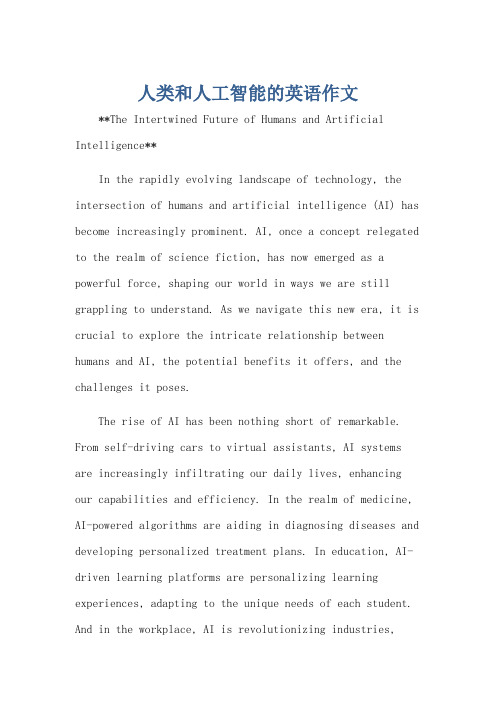
人类和人工智能的英语作文**The Intertwined Future of Humans and Artificial Intelligence**In the rapidly evolving landscape of technology, the intersection of humans and artificial intelligence (AI) has become increasingly prominent. AI, once a concept relegated to the realm of science fiction, has now emerged as a powerful force, shaping our world in ways we are still grappling to understand. As we navigate this new era, it is crucial to explore the intricate relationship between humans and AI, the potential benefits it offers, and the challenges it poses.The rise of AI has been nothing short of remarkable. From self-driving cars to virtual assistants, AI systems are increasingly infiltrating our daily lives, enhancing our capabilities and efficiency. In the realm of medicine, AI-powered algorithms are aiding in diagnosing diseases and developing personalized treatment plans. In education, AI-driven learning platforms are personalizing learning experiences, adapting to the unique needs of each student. And in the workplace, AI is revolutionizing industries,automating tasks, and freeing up humans to focus on more creative and strategic pursuits.However, the integration of AI into our lives is not without its complexities and controversies. One of the most significant concerns is the potential displacement of human workers by AI-driven automation. As machines become capable of performing increasingly complex tasks, there is a growing fear that many jobs will become obsolete. This, in turn, raises questions about how we will adapt our economic systems to accommodate this shift and ensure that everyone benefits from the advances in technology.Moreover, the ethical implications of AI are also a source of debate. As AI systems become more autonomous, making decisions that can affect people's lives, there is a need for robust ethical frameworks to guide their development and use. Concerns about bias, privacy, and accountability are paramount, as AI systems can inherit the biases of their creators and have the potential to misuse personal data.Yet, despite these challenges, the potential benefits of AI remain immense. By harnessing the vast computingpower and pattern recognition abilities of AI, we can tackle complex problems that have been beyond the reach of humans alone. In science, AI is assisting in the discovery of new drugs and materials, accelerating the pace of research and innovation. In environmental protection, AI-driven solutions are helping us monitor and mitigate the impact of climate change. And in social services, AI is enhancing the delivery of healthcare, education, and other critical services, making them more accessible and efficient.The key to realizing the full potential of AI lies in a balanced approach that combines human wisdom with machine capabilities. Humans bring unique qualities such as creativity, empathy, and ethical judgment that aredifficult to replicate in machines. On the other hand, AI excels in areas like data analysis, pattern recognition, and computational power. By collaborating and leveraging each other's strengths, humans and AI can achieve remarkable synergies.In conclusion, the future of humans and AI is one that is both exciting and uncertain. As we continue to exploreand harness the power of AI, it is crucial to maintain a balanced perspective, acknowledging both the benefits and challenges it presents. By fostering a culture of collaboration and ethical responsibility, we can ensure that AI serves as a tool that enhances human capabilities rather than replaces us. In this way, we can embrace the opportunities that AI brings and shape a future that is more prosperous, inclusive, and sustainable for all.**人类与人工智能交织的未来**在科技飞速发展的今天,人类与人工智能(AI)的交集日益凸显。
人工智能与人类的关系英语作文120字
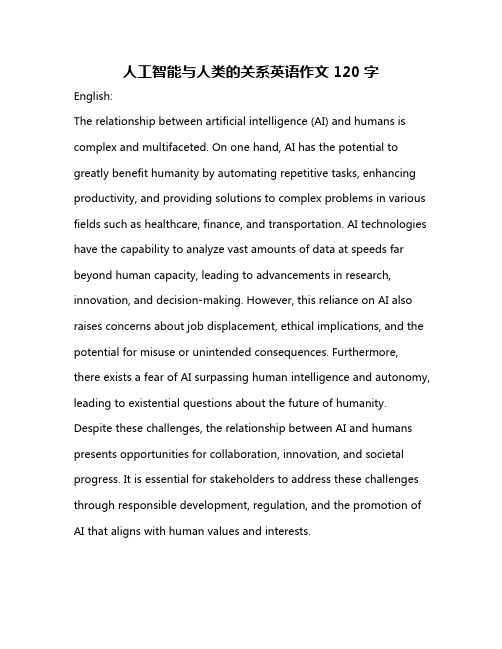
人工智能与人类的关系英语作文120字English:The relationship between artificial intelligence (AI) and humans is complex and multifaceted. On one hand, AI has the potential to greatly benefit humanity by automating repetitive tasks, enhancing productivity, and providing solutions to complex problems in various fields such as healthcare, finance, and transportation. AI technologies have the capability to analyze vast amounts of data at speeds far beyond human capacity, leading to advancements in research, innovation, and decision-making. However, this reliance on AI also raises concerns about job displacement, ethical implications, and the potential for misuse or unintended consequences. Furthermore, there exists a fear of AI surpassing human intelligence and autonomy, leading to existential questions about the future of humanity. Despite these challenges, the relationship between AI and humans presents opportunities for collaboration, innovation, and societal progress. It is essential for stakeholders to address these challenges through responsible development, regulation, and the promotion of AI that aligns with human values and interests.中文翻译:人工智能(AI)与人类的关系是复杂而多层次的。
人工智能和人类智能 英文演讲稿
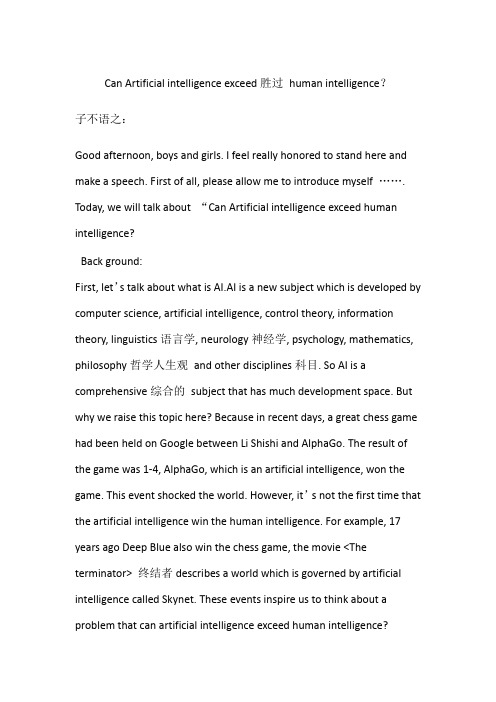
Can Artificial intelligence exceed胜过human intelligence?子不语之:Good afternoon, boys and girls. I feel really honored to stand here and make a speech. First of all, please allow me to introduce myself ……. Today, we will talk about “Can Artificial intelligence exceed human intelligence?Back ground:First, let’s talk about what is AI.AI is a new subject which is developed by computer science, artificial intelligence, control theory, information theory, linguistics语言学, neurology神经学, psychology, mathematics, philosophy哲学人生观and other disciplines科目. So AI is a comprehensive综合的subject that has much development space. But why we raise this topic here? Because in recent days, a great chess game had been held on Google between Li Shishi and AlphaGo. The result of the game was 1-4, AlphaGo, which is an artificial intelligence, won the game. This event shocked the world. However, it’s not the first time that the artificial intelligence win the human intelligence. For example, 17 years ago Deep Blue also win the chess game, the movie <The terminator> 终结者describes a world which is governed by artificial intelligence called Skynet. These events inspire us to think about a problem that can artificial intelligence exceed human intelligence?李欣颖:Middle:First we compare the human brain with computer. Consider the human brain,the human brain is an organism, it consists many complex systems that dominant our body. It can produce emotions, thinking and so on. It’s one of the difference compared the computer. Human brain is also good at memory, a person can memorize events that happened in the past. However most of these memories are not permanent. As time goes by, the human brain will give up these memories, only a few part can be left as permanent memory. Another important difference between human brain and computer is innovation. Innovation is a great quality that only exist in human brain. Because of the innovation, human gradually invent many new productions to help human live in a better life, computer is one of these productions.Compared with human brain, computer can not produce emotions and thinking, it also lack innovation. However computer has many good qualities that human brain don’t have. Like human brain, computer also has “memory”, but there are something different. Computer has “completely permanent memory”, only give it enough power and space, computer will “memorize”everything you have input. Computer is also good at calculation, like double counting, calculate the large number, deal with complex date and so on. The human brain can also do some of these calculations, but it will spend so much time and energy.Other calculation the human brain can’t do. Computer is made by all kinds of materials, it don’t have feelings, so computer can work in many bad conditions without tired.走吧:Above all, it is why human invent the computer. So no matter how advanced the artificial intelligence is, it is just tools. It is the same as toothbrush, pen etc. For instance, in terms of brushing your teeth, brush is more convenient than our hand, but you can't say the toothbrush is better than human’s hand: in terms of writing, pen is quicker than hands, but you can't say it over the people. AI is also like them, they are tools to make human’s life become more convenient.A lot of people in the car to beat movement ability. Still good in human walking. The car also in a very good development. In fact, the emergence of the smart go and car of truth is the same. Just expanded mobile ci and method!The impact of the AlphaGo is on the go, of course, and change is inevitable(不可避免的)! Things will never stay in one place one thousand years! Change is good! Is the inevitable thing!(Alphago 赢了的意义)唐景明:AI is invented by human, Artificial intelligence has fixed program, it runs by human input code. So artificial intelligence has a fatal shortcoming: it is not flexible. To quote(引用) a joke from the BBS: Li is just not pulling out the power of AlphaGo. But it is not just a joke,according to the last paragraph.Speaking of which, I suddenly remembered a famous "Goulding Knot" story: as long as who can solve the "Goulding Knot" , who will be the king of Asia. All those who have tried to solve the complicated strange knot failed at last, but when it was Alexander turn. He tried to find the end of the thread, but he failed,. In the end he said: "I want to create my own solution rules". He drew his sword, cut the knot. Alexander became the king of Asia.有个著名的“高尔丁结”故事:只要谁能解开奇异的“高尔丁结”,谁就会成为亚洲王。
人工智能英语视频演讲稿

人工智能英语视频演讲稿Artificial Intelligence English Video Speech。
Ladies and gentlemen, good morning/afternoon/evening. It is my great honor to have the opportunity to share with you today about the topic of artificial intelligence in English.Artificial intelligence, or AI, has become a hot topic in recent years. With the rapid development of technology, AI has been applied in various fields, such as healthcare, finance, education, and entertainment. It has greatly improved efficiency and productivity, and has brought about significant changes to our daily lives.First and foremost, let's discuss the impact of AI on the job market. Many people worry that AI will replace human jobs, leading to unemployment. However, it is important to note that while AI may automate certain tasks, it also creates new job opportunities. For example, AI engineers, data analysts, and AI ethicists are in high demand. Furthermore, AI can assist humans in performing repetitive or dangerous tasks, allowing us to focus on more creative and complex work.Moreover, AI has revolutionized the healthcare industry. With the help of AI, doctors can make more accurate diagnoses and develop personalized treatment plans for patients. AI-powered robots can also assist in surgeries, reducing the risk of human error. In addition, AI has enabled the development of wearable devices and mobile apps that monitor our health in real time, providing early warnings for potential health issues.In the field of education, AI has the potential to personalize learning experiences for students. By analyzing each student's learning style and pace, AI can tailor educational materials and exercises to meet their individual needs. This not only improves learning outcomes but also reduces the workload for teachers, allowing them to focus on mentoring and guiding students.Furthermore, AI has transformed the way we interact with technology. Voice assistants like Siri and Alexa, powered by AI, have become an integral part of our daily lives. They can help us with tasks such as setting reminders, playing music, andanswering questions. AI has also enhanced the entertainment industry, with algorithms recommending personalized content based on our preferences, making our entertainment experience more enjoyable and immersive.In conclusion, artificial intelligence has brought about tremendous changes and opportunities in various aspects of our lives. It is crucial for us to embrace AI and its potential, while also addressing the ethical and social implications it may bring. By leveraging the power of AI, we can create a better and more efficient world for future generations.Thank you for your attention. Let's embrace the era of artificial intelligence together.。
人工智能演讲稿英文

Artificial IntelligenceDear friends,There are scientific discoveries and inventions in every era. But today's scientific progress can affect the world in a very short time. This is the progress made in the field of artificial intelligence (AI).Artificial intelligence simply means that machines and computers learn, think and do what human intelligence does. With AI, machines do not perform certain tasks repeatedly, but operate according to the data we provide them to recognize human voice, use human language, drive a car, and even suggest the next treatment process or articles or books you may like to read.Artificial intelligence is something that affects our daily life. If you have ever used Baidu search engine, they will provide you with optimized search results that are very close to the AI based search results you require. At the other extreme, AI is used for robots, even for weapons that can work normally without human help.This can enable human beings to live an unprecedented comfortable life. With the help of artificial intelligence assisted robots or machines, many of the tasks they must complete areperfect. But there is a danger. What if AI gains more intelligent intelligence through some accidental or wrong human calculations, which can control human beings or destroy unheard of disasters?Yes, we have not yet seen that the benefits of AI far outweigh the risks assumed. Perhaps no one can stop the progress of science, nor can anyone stop those who have scientific pursuit and perseverance. They are enthusiastically engaged in the research and development of artificial intelligence. In the near future, what many people think is science fiction, people read in novels or see in movies, will become realistic and operable with the future.If AI creates a large number of automated jobs, will it replace many human skills and labor? This may be an interesting question that many people are concerned about. Or will AI create more jobs, or at least provide some career paths that intelligent children may pursue?Similarly, artificial intelligence created by human beings with complex thinking and behavioral capabilities can act in a destructive way if problems occur. Hacker attacks and programming errors, and even robots begin to communicate with each other in languages that humans cannot understand,are likely to be nightmares of tomorrow.As the world's leading technology companies compete with each other, they show their strength to the world through groundbreaking AI; As people strive to deify artificial intelligence into a demigod state, robots will one day acquire enough intelligence to challenge human power. Although this may be in the future, we may lose sleep in this regard just tonight.Thank you.。
- 1、下载文档前请自行甄别文档内容的完整性,平台不提供额外的编辑、内容补充、找答案等附加服务。
- 2、"仅部分预览"的文档,不可在线预览部分如存在完整性等问题,可反馈申请退款(可完整预览的文档不适用该条件!)。
- 3、如文档侵犯您的权益,请联系客服反馈,我们会尽快为您处理(人工客服工作时间:9:00-18:30)。
Can Artificial intelligence exceed胜过human intelligence?子不语之:Good afternoon, boys and girls. I feel really honored to stand here and make a speech. First of all, please allow me to introduce myself ……. Today, we will talk about “Can Artificial intelligence exceed human intelligence?Back ground:First, let’s talk about what is AI.AI is a new subject which is developed by computer science, artificial intelligence, control theory, information theory, linguistics语言学, neurology神经学, psychology, mathematics, philosophy哲学人生观and other disciplines科目. So AI is a comprehensive综合的subject that has much development space. But why we raise this topic here? Because in recent days, a great chess game had been held on Google between Li Shishi and AlphaGo. The result of the game was 1-4, AlphaGo, which is an artificial intelligence, won the game. This event shocked the world. However, it’s not the first time that the artificial intelligence win the human intelligence. For example, 17 years ago Deep Blue also win the chess game, the movie <The terminator> 终结者describes a world which is governed by artificial intelligence called Skynet. These events inspire us to think about a problem that can artificial intelligence exceed human intelligence?李欣颖:Middle:First we compare the human brain with computer. Consider the human brain,the human brain is an organism, it consists many complex systems that dominant our body. It can produce emotions, thinking and so on. It’s one of the difference compared the computer. Human brain is also good at memory, a person can memorize events that happened in the past. However most of these memories are not permanent. As time goes by, the human brain will give up these memories, only a few part can be left as permanent memory. Another important difference between human brain and computer is innovation. Innovation is a great quality that only exist in human brain. Because of the innovation, human gradually invent many new productions to help human live in a better life, computer is one of these productions.Compared with human brain, computer can not produce emotions and thinking, it also lack innovation. However computer has many good qualities that human brain don’t have. Like human brain, computer also has “memory”, but there are something different. Computer has “completely permanent memory”, only give it enough power and space, computer will “memorize”everything you have input. Computer is also good at calculation, like double counting, calculate the large number, deal with complex date and so on. The human brain can also do some of these calculations, but it will spend so much time and energy.Other calculation the human brain can’t do. Computer is made by all kinds of materials, it don’t have feelings, so computer can work in many bad conditions without tired.走吧:Above all, it is why human invent the computer. So no matter how advanced the artificial intelligence is, it is just tools. It is the same as toothbrush, pen etc. For instance, in terms of brushing your teeth, brush is more convenient than our hand, but you can't say the toothbrush is better than human’s hand: in terms of writing, pen is quicker than hands, but you can't say it over the people. AI is also like them, they are tools to make human’s life become more convenient.A lot of people in the car to beat movement ability. Still good in human walking. The car also in a very good development. In fact, the emergence of the smart go and car of truth is the same. Just expanded mobile ci and method!The impact of the AlphaGo is on the go, of course, and change is inevitable(不可避免的)! Things will never stay in one place one thousand years! Change is good! Is the inevitable thing!(Alphago 赢了的意义)唐景明:AI is invented by human, Artificial intelligence has fixed program, it runs by human input code. So artificial intelligence has a fatal shortcoming: it is not flexible. To quote(引用) a joke from the BBS: Li is just not pulling out the power of AlphaGo. But it is not just a joke,according to the last paragraph.Speaking of which, I suddenly remembered a famous "Goulding Knot" story: as long as who can solve the "Goulding Knot" , who will be the king of Asia. All those who have tried to solve the complicated strange knot failed at last, but when it was Alexander turn. He tried to find the end of the thread, but he failed,. In the end he said: "I want to create my own solution rules". He drew his sword, cut the knot. Alexander became the king of Asia.有个著名的“高尔丁结”故事:只要谁能解开奇异的“高尔丁结”,谁就会成为亚洲王。
